The diagnosis of persecution mania is this is a disorder of thinking, the symptoms and signs of which are distinguished by the patient's delusional conviction that certain people or a group of people follow him with the aim of causing harm. Most often, the condition is characteristic of patients with schizophrenia and psychosis with paranoid syndrome.
Record content:
- 1 The meaning of the concept
- 2 Causes of occurrence
- 3 Mechanism and stages of development
- 4 Risk factors
- 5 Complications and consequences
- 6 Symptoms
- 7 Diagnostic methods
-
8 Therapy
- 8.1 Psychotherapy
- 8.2 Use of medications
- 8.3 Electroconvulsive therapy
- 9 Rules of conduct with the patient
- 10 Stalking Mania Videos
The meaning of the concept
Persecution mania is a common name for the disease, which in the professional environment is called persecution delirium, persuasive delirium (from lat. persecutio - persecution). The concept of "mania" refers the disease to the category of manic disorders, which is not typical for the described pathology, therefore the deviation is called persecution delusion.
The disease is a dangerous syndrome, which is associated with the patient's likely aggressiveness during periods of exacerbation of delusional thoughts (in particular, friends, relatives, colleagues of the patient may suffer). During this period, the patient is sure that he is being spied on, that they want to steal or kill and cause any harm.
This causes a feeling of distrust, aggression and isolation, which forces the patient to limit their social contacts, "cover up your tracks", change the route to your home, transport and perform other actions to help avoid persecution.
Most often, delusions of persecution are part of the symptoms of other mental disorders: on average, about 70% of patients suffer from schizophrenia, 50% - from dementia of the Alzheimer's type and 40% - from alcohol poisoning, "alcoholic paranoid ".
Causes of occurrence
Persecution mania, symptoms and signs of which are characterized by delusional thoughts about people or creatures tracking the patient, can occur due to various reasons:
-
Schizophrenia. Symptoms with delusions of persecution are characteristic of this type of schizophrenia as paranoid. In this case, the patient, against the background of other symptoms of schizophrenia, has hallucinations and delusional thoughts. The patient has a violation of logical connections in the stream of thoughts, focusing the patient's attention on non-existent things.
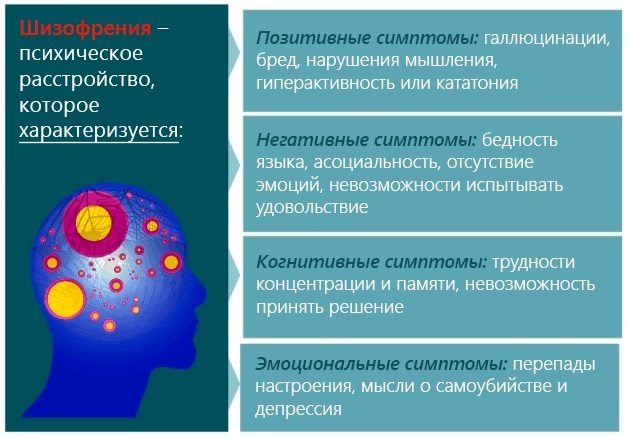
- Alcoholic paranoid. Persecution delusions can occur due to alcohol poisoning.
- Paranoia - a type of chronic psychosis, which is characterized by delusional ideas. Unlike schizophrenia, patients with paranoia do not lose the function of perception, they can function normally in society. The symptoms of patients are distinguished by an unhealthy suspicion, a tendency to see the intrigues of enemies in random events, to build complex conspiracy theories against themselves.
- Alzheimer's disease. Persecution delirium is one of the symptoms of senile dementia in the later stages of the pathology.
- Suspicion, distrust. People with certain personality traits are prone to delusions of persecution. Distrustful patients usually limit the circle of social contacts to a minimum, do not tell anything about themselves, may suspect others of espionage or malicious intentions towards him. Often, an obsession with suspicion and distrust leads to delusional thoughts in the patient.
- High external locus of control. People with a high external locus of control are confident that their lives are completely controlled by someone else, providence, any external force, which aggravates fears about their safety and can provoke the onset of delirium persecution.
- Victim complex. A life position based on self-pity and feeling unhappy, unlucky, restless, unnecessary. A person with a victim complex experiences constant discontent, blames others and circumstances for his troubles, is unable to take responsibility for one's own life, which can lead to the development of delusional symptoms without appropriate work with a psychotherapist persecution.
- Injuries, negative life experiences. Situations in which a person feels overwhelming helplessness, hopelessness and at the same time is exposed to violent actions on the part of others, form in him a sense of danger, which comes from others (or a certain group others). In stressful situations, such people always feel threatened and quickly switch to self-defense.
Mechanism and stages of development
The persecution mania is realized in the stages of pathology, the symptoms and signs of which differ from a milder to the most severe degree of exacerbation of the disease.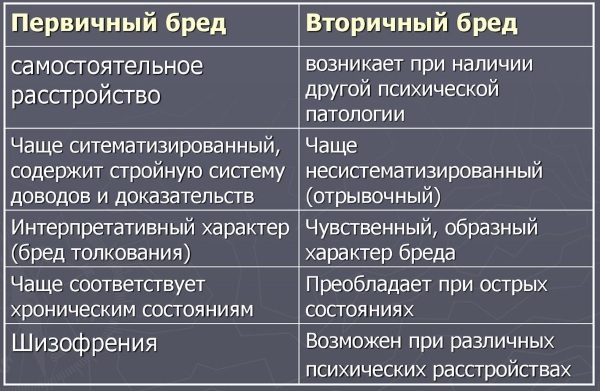
| Stage name | Characteristic |
| 1st stage (primary disorders) | At this stage, the patient has the first signs of persecution delirium: isolation, distrust, increased suspicion. The patient begins to feel constant anxiety, which forces him to avoid crowded places and new acquaintances. |
| 2nd stage (bright severity) | The asociality of the patient at this stage becomes aggravated and noticeable to others. The patient becomes excitable, aggressive, begins to repel others. He has problems in his personal life and professional environment. |
| 3rd stage (peak exacerbation) | The patient suffers from a constant feeling of fear for his life, tries in every possible way to "break away" from the persecution by changing the route to home, work, shops, transport. Close people of the patient may at this stage be enemies and spies in his eyes, which can push the patient into aggressive dangerous actions towards them. The danger of the 3rd stage also lies in the possible harm to oneself, which can lead to suicidal attempts. |
Risk factors
There is a theory that one of the factors that can contribute to the development of persecution delusions is a congenital feature of the human nervous system. It manifests itself in increased sensitivity, emotionality, and a tendency to exaggerate.
Particularly susceptible to the onset of the disorder are people who in childhood faced hypercontrol in upbringing. or ignorance on the part of loved ones, which further contributes to the development of a complex of victim and delirium persecution. Failure in the nervous system can also occur under the influence of traumatic situations.
Some researchers believe that risk factors for the onset of the disease are reduced not only to a person's upbringing and traumatic events from his childhood, but also to the functioning of the brain. This theory is based on the discoveries of physiologist Ivan Pavlov, who believed that human behavior changes under the influence of pathological activity of brain regions.
Complications and consequences
Persecution mania, the symptoms and signs of which must be noticed even in the early stages of the disease, can lead to negative consequences when lack of timely treatment:
- the patient loses the sense of reality, cannot distinguish delusional thoughts from healthy ones;
- everything around the patient in his provision becomes potentially dangerous, because of which the patient feels constant anxiety;
- the patient begins to isolate himself and try to isolate himself from society, refuses to eat, suffers from insomnia;
- during periods of exacerbation of delusional thoughts, the patient reacts extremely aggressively to others;
- the patient may resort to suicide attempts.
Such complications require urgent hospitalization of the patient and strict control over him by medical personnel.
Symptoms
Delusions of persecution can be detected when the patient detects most of the following symptoms:
- distrust;

- attacks of aggression;
- isolation;
- the desire for self-isolation;
- constant anxiety;
- constant feeling of fear;
- sleep disturbance, appetite;
- confidence that others are secret agents, enemies or ill-wishers who want to harm the patient;
- taking measures to avoid surveillance: changing clothes, routing, creating a language for notes that encrypt records;
- search for meaning in random and ordinary events;
- the number of "persecutors" grows with the development of the disorder;
- inability to critically assess their symptoms.
Also, delusions of persecution can be identified by the symptoms characteristic of different types of delusions.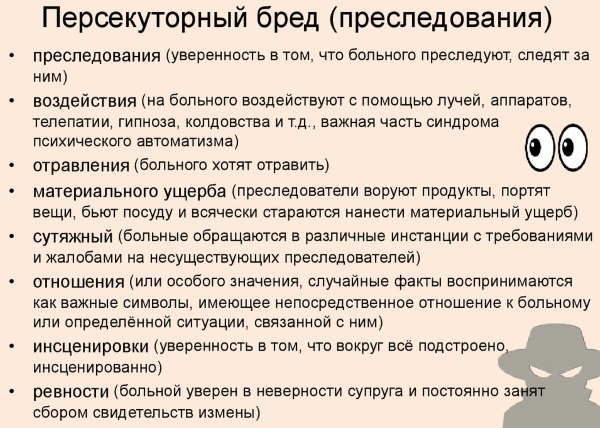
| A kind of pursuit delusion | Symptoms |
| Damage | The patient worries about his property and is sure that others want to spoil it, damage it or appropriate it. |
| Poisoning | The patient is sure that they want to poison him. Obsessive thoughts make him suspicious of any food or water that he takes outside the house, or that has been prepared without his close supervision. |
| Querulianism | The patient's behavior is characterized by a constant struggle for his rights and infringed interests, which are often greatly exaggerated. The patient constantly submits complaints to all possible instances, claims to the court. |
| Jealousy | The patient, being in a relationship, is constantly jealous of a partner for no apparent reason. Ideas about cheating or betrayal make the patient follow the subject of jealousy, "test" it, constantly feel anxiety and fear of rejection. |
| Staging | The patient's life seems to him to be a well-staged performance, where people are actors, the setting is scenery. Events occurring with the patient are interpreted by him as an experiment or a special show with his participation. |
| Doubles | In this case, the patient may see in strangers his friends or relatives, or he may not recognize his loved ones, mistaking for them strangers with make-up. |
| Accusations | The patient is sure that those around him treat him with condemnation and hostility; any action of the patient out loud or mentally condemned and accused by other people. |
Diagnostic methods
Persecution mania, the symptoms and signs of which you need to know for timely referral to a specialist, diagnosed by a psychotherapist or psychiatrist (if necessary, medication treatment).
With the onset of the first symptoms, it is necessary to consult a doctor for the correct diagnosis and the formation of a comprehensive treatment. The examination is often carried out together with a loved one of the patient, who will be able to adequately tell the doctor about observed symptoms in cases of the patient's loss of a sense of reality and his inability to critically assess his disorder.
During the examination, the following types of diagnostics can be used:
- Observation. First of all, in consultation with a specialist, the doctor assesses the patient's behavior. Most often, among the observed features, one can notice stiffness, uncertainty, suspicion and isolation of the patient. In severe stages of the disease, the patient refuses to trust the doctor, listens to extraneous sounds, asks to close the doors and windows in the offices.
-
Conversation with a psychotherapist. With direct contact between the patient and the doctor, data on the patient's mental state in the past, the presence of concomitant diseases, and possible drug or alcohol dependence are revealed. The specialist also considers the option of real persecution, analyzes situations (if any) in life patient related to debt, revenge and crime that could be a real reason for persecution. During the conversation, the patient is often very distrustful and suspects the doctor of conspiracy with his enemies.

- Testing. Psychological tests help to study the cognitive functions and personality states of the patient. These tests include the Minnesota Multidimensional Personality Questionnaire, which examines the individual characteristics and mental states of a person. Also, the method of diagnosis includes the Cattell's multifactorial questionnaire, which consists of 187 questions and reveals the characteristics of the character, inclinations and interests of the individual. In addition to the questionnaires, there are tests for interpretation, drawing tests, tests of thinking and memory. The thematic apperception test, which reveals internal conflicts, drives, interests and motives of the patient, is useful in diagnostics. The patient is offered black and white drawings, most of which depict people in everyday situations. The subject, based on the images, comes up with a story for each picture, tells what they think and the characters of the painting feel, what they want, what led to the situation depicted in the painting, and how will end. The patient's responses are recorded verbatim and analyzed by a specialist.
Therapy
Persecution mania, the symptoms and signs of which must be detected in the early stages of the disease for more effective treatment, amenable to therapy using various methods. The main method of working with patients with delusions of persecution is psychotherapy, sometimes at the advanced stages of the disease, the patient is prescribed medication.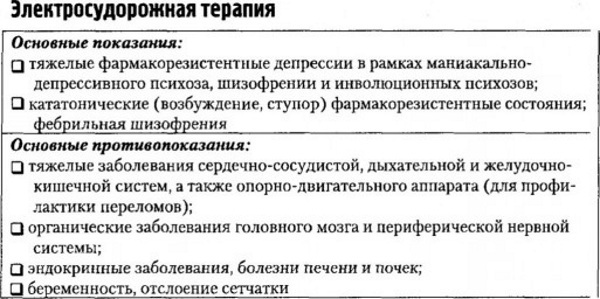
Electroconvulsive therapy is an effective and safe treatment for many psychiatric disorders, but its use is controversial. The choice of treatment for persecution delusions depends on the complex of therapy prescribed only by the attending physician; self-treatment can significantly worsen the patient's condition.
Psychotherapy
The most well-known and effective treatment for persecutory delusions is cognitive-behavioral therapy. Its course can last from 7 to 20 sessions, depending on the severity of the disorder and the patient's desire to work with a doctor.
During the sessions, the doctor tries to explain to the patient his incorrect perception of the world around him, because of which there is a feeling of fear and a feeling of persecution, anxiety. As a result of therapy, the patient studies the mechanisms of his feelings and learns to control his feelings.
There is also a psychoanalytic approach that sees the problem of panic, anxiety and fear in a person's intrapersonal conflicts. To recognize the patient's internal conflict, the doctor uses the technique of projections and transference, and after identifying the necessary elements of subconscious contradictions, he tries to show them to the patient.
As a result of therapy, the patient develops self-awareness, understanding and the ability to analyze the motives of his actions. Thus, he learns to control his emotions and know the source of their origin.
Family therapy, art therapy is also effective. These methods are additional, but quite effective for working out your emotions and relationships with people.
Persecution delirium is a difficult disease for the patient's loved ones to accept, so family therapy will help to establish contact between the patient and his family. Art therapy is the patient's way of expressing their emotions through creativity, which is an important complementary part of mainstream psychotherapy.
Use of medications
The use of medication during persecutory delusions depends on whether the illness is due to another mental disorder or disorder. Also, the individual characteristics of the patient, the severity of delirium and the adequacy of the patient affect the taking of drugs, therefore, drugs are prescribed exclusively by the attending physician.
The most commonly prescribed medications for treating persecution delusions and related conditions are:
-
Phenazepam. The drug is prescribed early in the development of the disease and helps relieve symptoms such as anxiety, tension and depression.
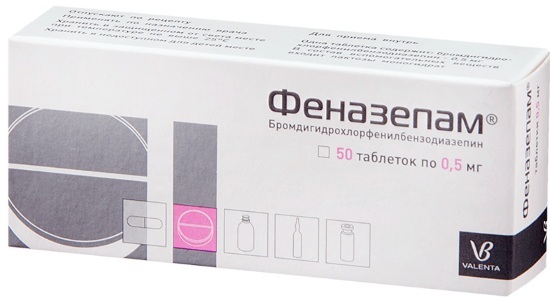
Phenazepam is a sedative pill that relieves an alarming symptom in persecution mania. - Alimemazine, thioridazine, quetiapine. These antipsychotics should be used only during acute attacks of panic attacks, anxiety. They function only to suppress anxiety, without relieving other symptoms. Antipsychotics are characterized by side effects in the form of lethargy, lethargy and hormonal changes.
- Rispolept. The drug is prescribed only for acute forms of schizophrenia and inhibits the active development of symptoms of the disease, eliminates hallucinations, delusional states, increased aggression and depression.
- Clonazepam, oxazepam. The drugs are able to quickly relieve the patient of anxiety symptoms and are used at the very beginning of treatment. Funds are not the only drugs prescribed; they are used in combination and in special dosages with other antidepressants, which is associated with the likelihood of a patient's dependence on tranquilizers.
- Lithium preparations. Psychotropic lithium drugs are taken during periods of mania. Its action is aimed at reducing impulsivity and aggression, but the action begins to manifest itself only on the 5th day of admission, so the drug is used as an additional tool in the course with others medicines.
- Cyclodol. The medicine is taken to eliminate the patient's movement disorders, which often occur during an exacerbation of schizophrenia. Cyclodol is prescribed for the treatment of muscle stiffness, tremors and various spasms.
- Fluoxetine, Zoloft, Prozac. The drugs are antidepressants and are most often prescribed in the periods between exacerbations of the disease. Medication is needed to improve mood, correct sleep problems, and generally improve the patient's psychological well-being.
Electroconvulsive therapy
Electroconvulsive therapy (ECT) has at various times been considered a method of violence, an unsafe way to treat mentally ill patients. Despite this, today ECT is considered effective in the treatment of severe mental disorders.
Indications for electroconvulsive therapy are:
- depression (severe forms of the disease, the occurrence of suicide attempts);
- bipolar disorder (a disease with rapidly changing cycles of depression and mania, psychotic symptoms, suicidal tendencies);
-
schizophrenia (acute schizophrenia in combination with severe psychosis, catatonic syndrome (movement disorder)).
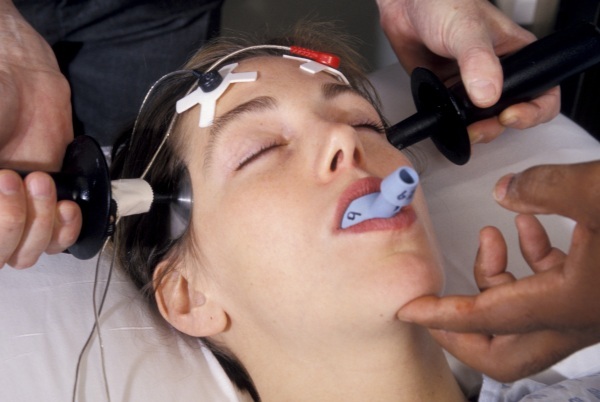
Electroconvulsive therapy can be effective in treating persecutory delusions most often when combined with symptoms of schizophrenia.
The mechanism of action of ECT is not fully understood, but it is known that the therapy affects components of the central nervous system. After the therapy session, the neurotropic factor of the brain changes, that is, the human protein that acts on certain neurons of the central and peripheral nervous systems, as a result of which its level changes.
Contraindications for electroconvulsive therapy:
- diseases of the field of cardiology (volumetric intracranial processes);
- neurological abnormalities (angina pectoris, heart failure, arterial hypertension, ventricular arrhythmias);
- mental disorders (obsessive-compulsive disorder);
- vegetative insufficiency;
- diabetes;
- metabolic disorders;
- chronic obstructive pulmonary disease;
- renal failure;
- gastroesophageal reflux disease.
Side effects of electroconvulsive therapy:
- memory loss;
- convulsive attack;
- sinus tachycardia;
- hypertensive attacks;
- headaches;
- mania;
- sleep disorder;
- disturbances of consciousness.
Rules of conduct with the patient
Patients with delusions of persecution most often do not realize their illness and are confident in their righteousness, therefore they are not blame for the manifestation of symptoms that a healthy person seems delusional, unreasonable and unclear. It is necessary to be understanding and benevolent, to calm down the patient during periods of panic, severe anxiety or fear, and not to laugh at his problems.
It is not advisable to tell the patient that there is no persecution, it is impossible to convince him of this, therefore by these actions, in the patient's mind, one can refer oneself to the "accomplices" of the persecutors and lose confidence sick.
It is necessary to be prepared for the patient's aggression and hostility, therefore it is important to maintain self-control, patience and goodwill, not to raise your voice, not to use physical force; this can frighten the patient, which will affect his trust in the person, and negatively affect the further process of treatment.
It is worth remembering that delusions of persecution are a severe and difficult to treat disease in severe stages. and in conjunction with schizophrenia, therefore, to live with a sick person and constantly calm him down impossible; it does not contribute to recovery in any way. The best solution when detecting symptoms of the disease is to consult with a specialist psychotherapist or psychiatrist.
Persecution mania thinking disorder has symptoms and signs characterized by persecutory obsessions. In advanced stages, the delusions of persecution become dangerous both for the patient himself and those around him, therefore, it is important, even during the first manifestations of symptoms, to consult a specialist for a qualified help.
Stalking Mania Videos
The doctor about the delusions of persecution:



